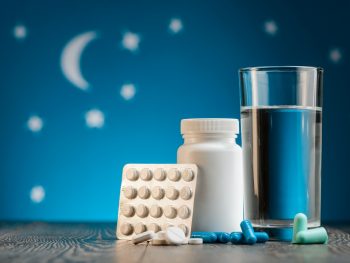Sleep deprivation can lead to life-threatening decisions and accidents. There are two types of sleep deprivation and many people don’t know they’re experiencing the worst type of sleep deprivation.
Have you ever spent a night trying to get to sleep but all your efforts were in vain? The next day, you knew you were sleep deprived. But if you chronically fail to get enough sleep, you end up with a form of sleep deprivation that is more dangerous because it feels normal to you.
Tossing and turning in the bed all night and not getting any sleep can make you grumpy, tired, and cranky the next day. If you repeatedly have difficulty getting to sleep or staying asleep, the very real effects of sleep deprivation will make your life miserable.
The reasons people experience sleep deprivation are:
- Psychological stress
- The light from electronics (computers, televisions, and smartphones)
- Keeping their brain too active late at night
- Not exercising or exercising too late in the day
- Being too warm
- Drugs, alcohol, caffeine
Sleep deprivation affects your mood, intelligence, outlook, and your health.
As the name suggests, sleep deprivation is basically when a person doesn’t get the sleep they need. The amount of sleep needed by a person to stay fresh and avoid sleep deprivation varies between individuals.
Studies show that adults are more capable of handling temporary bouts of deprivation while teenagers and young adults are more susceptible to the effects of sleep deprivation. This does not mean that sleep deprivation is not a serious issue for many adults.
Definition of Sleep Deprivation
Sleep deprivation is a situation where a person doesn’t get enough sleep. Sleeping recharges your body. When you’re sleep deprived, it is like your batteries are depleted. Sleeping charges your body and your senses by giving it a boost of energy. If you lack adequate sleep, you will not be able to function properly.
There are two types of sleep deprivation; it can either be chronic or acute.
In chronic deprivation, the patient can feel fatigued, sleepiness during the day, clumsy, experience weight loss or weight gain, depending on how the body reacts. Acute deprivation is total deprivation which when a person doesn’t get any sleep for one or more nights.
Some of the facts about deprivation that everybody should know are as follows:
- When you don’t give your body the amount of sleep required to remain fresh, you keep adding to the debt, this debt becomes sleep deprivation.
- Sleep deprivation can occur as a result of medical conditions, mental illness, or medications.
- Studies have shown that sleep deprivation has contributed to some very dangerous and disastrous accidents in ships, cars and space ships.
- Lack of sleep can cause changes in your intelligence level, aptitude, cognitive reasoning abilities, alertness, as well as your ability to focus and concentrate.
Sleep Deprivation Symptoms
A normal person needs at least seven to nine hours of sleep during the night. There are many symptoms our body uses to warn us we are sleep deprived. One of the main symptoms is sleepiness throughout the day. You don’t feel fresh and have a foggy mind. You yawn frequently and may be restless because of the lack of sleep.
Apart from this main symptom, other indications can be:
- Hunger: Sleep deprivation can make you very hungry and more likely to choose high calorie and high sugar foods. Since your body is not getting enough energy, your brain attempts to energize it with food. It gives the body hunger signals so that the body will get more energy from food.
- Obesity: Weight gain frequently occurs in conjunction with sleep deprivation. Since you start eating a lot and your body is not able to burn the calories, they convert into fat. Sleeping also helps burn calories.
- Impulsive behavior: Due to deprivation, your mental function declines. You’re more likely to make poor, impulsive decisions. You’ll be less rational and if you’ve ever struggled with an addiction, you’ll have more difficulty resisting temptations when you are sleep deprived. You’re also more likely to make decisions that don’t meet your normal ethical or moral standards.
- Memory problems: During sleep, the connections of your brain are formed and reinforced so that you can retainthe knowledge you gained during the day. A lack of sleep messes with these connections, affecting both your short-term memory and your long-term memory. You start forgetting where you put your car keys or important documents.
- Mood swings: Lack of sleep can make you very distracted and moody. It can make you easily irritated and short tempered. You start feeling cranky and find yourself irritated by things that wouldn’t normally bother you. This can negatively affect your relationships and your work.
- Weakened immunity: Sleep deprivation can interfere with the way your immune system functions. You’ll be more likely to become ill with minor maladies and over time, if you remain sleep deprived, serious health consequences are likely to occur including endocrine problems and heart disease.
- Skin: In the end, your skin may be affected, appearing dull with dark circles under your eyes. You may experience more acne or stress related issues like eczema.
Sleep Deprivation Effects
The negative effects of sleep deprivation are vast. While you are sleep deprived, every part of your body is affected in one way or another. From weight gain to your marriage, every aspect of your life can be negatively affected.
- Lack of concentration: When you don’t get enough rest your ability to think properly, focus, and concentrate on things is diminished.
- Heart disease including High Blood Pressure: The risk of suffering from high blood pressure significantly increases if you get less sleep time than you should. High blood pressure is associated with a lot of diseases which including strokes and heart attacks. Inadequate sleep causes inflammation, which is a stress response to lack of sleep. This along with high blood pressure causes a great risk of heart attack.
- Hormones: Deprivation can also mess with the hormonal levels of your body which also affects your libido. In men, it causes a low level of testosterone and in women, it disrupts the balance of estrogen.
Sleep Deprivation Stages
As you start losing your sleep cycle and go through a phase of deprivation your body undergoes a number of changes. With time these changes intensify and make things even harder. Some of the starting stages and changes that come with deprivation are:
- 24 hours: once you go the first 24 hours without sleep, you will notice a change in your judgment of things, your coordination and balance as well as your memory. This change is comparable to what happens when a person has 0.1 percent of alcohol in his/her bloodstream. You will be cognitively and physically impaired.
- 36 hours: After the first 36 hours pass, sleep deprivation negatively affects your body’s functions at basic levels. The number of inflammatory markers in your bloodstream start rising significantly which can cause heart-related issues, increase pain, and you could experience microsleep that makes driving or operating machinery very dangerous. Microsleep is when you fall asleep for brief period (i.e. 30 seconds). You also might start feeling dizzy.
- 48 hours: After two full days of sleep deprivation, you start feeling disoriented.
- 72 hours: The worst conditions start appearing after 72 hours without sleep. Major cognitive deficits followed by hallucinations are witnessed. Your perception of things and concentration is significantly affected. Even small day to day conversations seem difficult and energy draining. The physical toll of severe sleep deprivation can bring on serious medical problems such as seizures and heart attacks.
Don’t miss: How Much Sleep Do I Really Need
People who die as the result of sleep deprivation usually die in accidents which are common among the sleep deprived. Dying from sleep deprivation itself is rare and typically limited to a small genetic pool that experiences fatal familial insomnia which is inherited. Normal deprivation where you don’t get enough sleep messes with your mood and coordination, but it cannot be directly fatal until it reaches the extreme.
In animal studies, animals will die from sleep deprivation, but human brains tend to survive with microsleep. The animals probably died from a combination of lack of sleep and stress because they didn’t understand why they were awake which would have added to the stressfulness of being kept awake.
You’re far more likely to die from an accident while you are sleep deprived than from sleep deprivation itself. Driving while sleep deprived is as dangerous as drunk driving. Your brain will try to go to sleep before you get to extreme places. While you can use willpower to overcome those urges, your ability to function becomes so impaired that there’s little reason to stay awake.
Causes of Sleep Deprivation
Sleep deprivation is mainly caused by bad sleeping habits. If you leave most of your work to for doing at night or are fond of spending nights out with friends, you cycle can be disrupted to an extent from where coming back is not very easy. You have to make sure you get a sound sleep for the number of hours that is required by your body.
The amount of sleep required by you depends on your age. Adults require an average of 7 to 9 hours of sleep daily. As compared to this, children between ages 6 to 13 require 9 to 11.
Once this requirement is not met, the sleep debt starts increasing and after a certain amount of time, your body starts going through the phase of deprivation even if you are sleeping every night and just not getting enough sleep.
Who is at a Risk of Sleep Deprivation?
No one is safe from sleep deprivation. It affects people of all races, ethnicities and ages, but certain groups of people are more susceptible to this because of their nature of work and the way their body works. The people who are at a greater risk of developing deprivation are:
- People who are on medications that affect their sleep cycle.
- People who do shift work that interferes with their internal biological clock. These include nurses and doctors who have to work night shifts and also students who are adopting the change in the environment. It is worse when they have a mix of day and night shifts. If you have to work at night, it is best to always work at night.
- People who abuse medications, drugs, and caffeine laden drinks to keep themselves awake.
- People who have medical conditions that go undiagnosed like anxiety and depression.
- People whose work requires them to sleep very little, for example.
- New parents whose sleep is disrupted by the baby’s needs during the night.
- Individuals who experience psychological stressors that interfere with their ability to relax.
What makes you sleep?
Your sleep cycle depends on two important factors in your body. Your body has a body clock which has a circadian rhythm that has a repeating cycle of 24 hours.
The first thing responsible for controlling the rhythm is the building pressure that makes you feel sleepy. This pressure increases with every growing hour. Adenosine is responsible for this pressure. The time, during which you are awake, the level of adenosine keeps on increasing. When it reaches a certain level, the pressure starts building and makes you sleepy.
The second thing that controls this body clock is your internal clock which is triggered by the environment. The light and the dark atmosphere along with the peacefulness of night is what makes you feel sleepy. Similarly, the hustle bustle of the day prevents you from getting drowsy.
Cortisol is the compound that is released by your body on sunrise. This compound prepares your body for waking up in the morning.
Sleep Deprivation Treatments
Through behavioral changes
When a person is having physical or psychological problems in sleeping, treatment is required. A therapist or a sleeping specialist can help the patient by introducing a number of techniques that can help in eliminating the root cause and getting rid of the deprivation. Some of these techniques are:
Relaxation: Some of the people who suffer from deprivation cannot go to sleep due to their extremely anxious mind and body. They can learn relaxation techniques such as using a process of repeatedly relaxing and tensing of their muscles which calms the body down. This is done by different muscles at different times.
Decreased Stimulation: this is the process of controlling and stimulating your environment in a way that makes you sleepy and helps you fall asleep. For example, this might include keeping your environment dull and boring a few hours before going to sleep. This way the patient starts feeling peaceful and sleepy after some time.
Cognitive behavioral therapy: This therapy helps eliminate harmful beliefs that can increase stress from a person’s life.
Avoiding caffeine and other stimulants can improve the ability to go to sleep.
Avoiding screen time on computers, smartphones, tablets, and televisions can help you go to sleep. The blue light on these screens can interfere with the body’s sleep-wake cycle.
Sleep Deprivation Treatment Medication
In cases where therapy and behavioral changes don’t help and all the efforts of therapists are in vain, medications are important. These medications help in the induction of sleep in the patient. Some of these medications can be bought directly from the pharmacy while others need a prescription from a doctor.
A large variety of medications is available. The kinds of medication that work for a patient depending on their body type and routine. Some of the most used medications for deprivation treatment are benzodiazepines, non-benzodiazepine hypnotics, and melatonin receptor, antagonists.
The importance of limiting your dosage is significant as some patients tend to develop a dependency on these medications which can cause even more complications.
Drugs should only be used as a temporary measure while you address other sleep hygiene issues. Using sleeping aids is not a healthy choice. Their use increases the risk of developing cancer and of dying from any cause.
Also read: Can you overdose on melatonin
Home management to get enough sleep
The best part of self-diagnosis and treatment is that you can detect problems at an early stage and use good sleep hygiene recommendations to create a routine that allows you to get the healthy sleep you need. To improve your habits and prevent any kind of deprivation, you should follow these tips.
- Make sure you to bed whenever you feel sleepy or tired. Don’t let the pressure build.
- Keep your routine consistent. Decide on a certain bedtime and go to bed at that time every day.
- Make sure you have your last meal at least three hours before your bedtime.
- If you cannot sleep after half an hour of trying, don’t lay there frustrated. You can read quietly, put on soothing music, meditate, or get up and do something relaxing until you feel sleepy.
- Indulge in physical activities during the day but nothing too strenuous (other than sex) after dinner.
- Stay away from all kind of electronic devices at least an hour before going to sleep.
- Use in relaxation techniques before going to bed.
- Keep your room quiet and dark when you go to bed.
- Move to an environment with relaxing light an hour before bedtime.
- Use aromatherapy. Scents like lavender can help you relax and go to sleep.
Making these techniques a part of your daily life will help you avoid sleep deprivation.
Conclusion
With sleep deprivation, the part of your brain that deals with reasoning is affected the most. This is known as the prefrontal cortex. The amygdala, which deals with your emotions, also gets affected and your emotions can be erratic.
To prevent situations like these, it is extremely important that you develop a routine and pay attention to how much sleep you’re getting. Where small disruptions in your nap might not lead to a big problem, an ongoing and repeated lack of rest can cause big problems. Pay attention to how you feel and if you’re sleepy during the day, go to bed a little earlier and try to catch up on sleep.
Sleep Tight!









Leave a Reply